A unit of Guosen Securities, China's eighth-largest investment bank said on Thursday it had not neared default on its offshore debt after uncertainty over payments raised questions over so-called "keepwell" deals, or promises by mainland groups to support the borrowing of their offshore units.
The bonds' trustee, Bank of New York Mellon, said late on Thursday it had received a clarification notice from Guosen that sought to "correct statements set out in earlier communications". The notice in effect amended an early note from BNY Mellon that warned bondholders of an "event of default".
While no payments had yet been missed, the technical phrase sparked worries over keepwell agreements, used by mainland groups to support the borrowings of their offshore entities in dollars as well as renminbi, before rule changes in 2014 allowed them to issue legal guarantees.

Guosen said on Thursday in a statement to the Hong Kong stock exchange, where the bond trades, that it was "confident that it will be able to fully comply with its payment obligations in respect of the Bonds".
The earlier notice from BNY Mellon had cast doubt on whether the securities company would meet a Rmb38m ($5.9m) coupon payment due on April 24 on its Rmb1.2bn in so-called "dim sum" bonds — renminbi debt sold outside the mainland.
More from the Financial Times :
Wall St wary as quarter draws to a close
Native English speakers must learn how they come across
Brussels points finger over Tata and anti-dumping tariffs
Credit specialists in Hong Kong said earlier on Thursday that the first BNY Mellon notice appeared to be technical in nature, relating to approvals needed for Guosen's mainland unit to transfer funds to its Hong Kong unit.
"Our base case is this technical issue will be solved. But going forward, capital control might be a risk investors should consider in assessing the keepwell structure," said Manjesh Verma, head of credit sector specialists at Citigroup in Hong Kong. "It is an issue not only for the dim sum market, but for the broader China offshore bond markets given that there are a number of bonds in dollar and dim sum space which have this keepwell structure and this structure has not been tested yet."
In mid-afternoon trading in Hong Kong, the bond's yield, which moves inversely to price, rose to 7.12 per cent from 6.4 per cent.
Chinese companies have used keepwells in offshore bond sales as a way to provide a degree of security to foreign investors. Until mid-2014, China's foreign exchange regulator forbade onshore companies from issuing direct guarantees of offshore debt.
Most Chinese offshore bonds are issued through tax-haven-domiciled SPVs, leaving investors with little recourse to onshore assets. BNY's March 23 notice said that the event of default was caused by a violation of the keepwell deed, without providing details.
The dim sum bond market emerged around 2010 as China moved to encourage international use of its currency. With renminbi accumulating in Hong Kong and other offshore financial hubs, Chinese and foreign issuers took advantage of interest rates typically lower than those available in China's onshore debt market. Last year, offshore renminbi bond issuance slumped to $17bn after hitting a record $33bn in 2014, according to Dealogic. Some $64bn in such bonds is currently outstanding.


